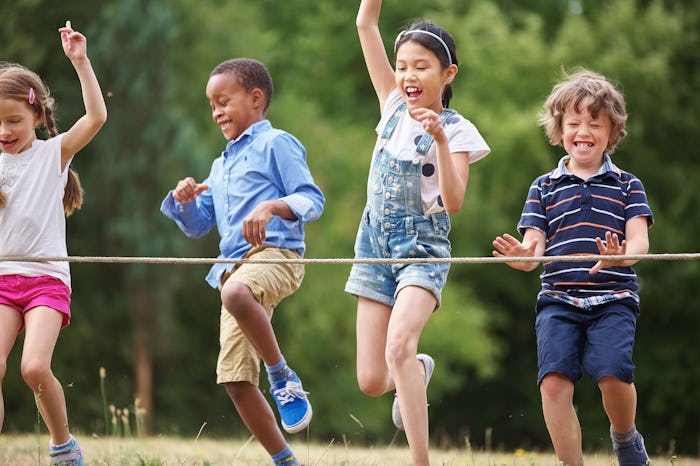Life

Is It Safe To Send Kids To Day Camp This Summer? Here's What The Experts Say
Arts and crafts, potato sack races and popsicles are just a few things that make summer camp amazing, as any camper can tell you. In fact, camp kids look forward to spending time with their friends doing the things they love all year long. But is summer camp safe this year, with the pandemic still ongoing? Parents might have to make a tough call about whether to let kids attend or not.
If your child's summer camp is open this year, then is it really safe for them to attend? "There’s risk in everything, and only a parent can make this kind of a decision for their child, but we’ve come up with the safest way to operate camps," Paul McEntire, chief operating officer for YMCA of the USA, tells Romper. "If a parent were to ask me, I’d encourage them to speak directly to their camp." In general, camps are taking health safety protocol seriously during this summer of the coronavirus. "In order to stay safe, summer camp directors are talking with the local government's health department and following their procedures," summer camp consultant Mark Evans tells Romper. Those who run summer youth programs have many resources on current safety guidelines, thanks to the detailed American Camp Association's Approach to COVID-19 field guide, as well as the CDC's Youth Program and Camp Decision Tree. Parents can also review these guides for a better sense of what a safely run camp should look like at this time.
So what safety procedures should be in place if parents send their children to camp? "There should be adequate hand sanitizer and soap and water for the campers, and staff should encourage frequent use of each. It would be ideal for camp counselors and older children at least to wear masks/face coverings, especially when indoors and in crowded situations," Chad Sanborn M.D., a pediatric infectious disease physician with KIDZ Medical Services, tells Romper. "Camp counselors should have basic knowledge in identifying kids who are ill or be able to be in contact with medical professionals who can rapidly identify someone who is ill." Contact your camp to learn whether they have these sorts of safety measures in place.
In addition to increased efforts at cleanliness and sanitation, many camps are also focused on preventing COVID-19 from getting anywhere near its campers. "Summer camps will also be screening campers when they arrive on-site for any symptoms," says Evans. "They'll be doing things like temperature checks and asking campers questions regarding potential exposure." At the Y, some camps will begin a screening process two weeks before the start of camp, and then continue with daily temp checks, as McEntire explains.
In addition, the basic setup of some camps will look a little different this year. Many camps will use the cohort system, organizing kids into groups of ten with two adult supervisors. The different cohorts will not interact, so if one group does experience symptoms of COVID-19, it hopefully won't spread throughout the entire camp, says McEntire. Some activities, such as high ropes, may not take place because they are difficult to keep sanitary. For an activity like archery, the kids will be more spread out, and there will be a focus on keeping the bows and arrows cleaned between kids, McEntire says.
When you're considering camp, it's also important to consider your own child's individual health needs. "The family of a high-risk child or a child with a chronic underlying illness should always check with their pediatrician before going to camp," says Dr. Sanborn. "For other children with no medical problems, it is never a bad idea to discuss the possibility of camp with their pediatricians. They may be able to give more detailed recommendations based upon the child's developmental level and medical history, catch the child up on any vaccines that may be lacking and give more personalized recommendations on the pros/cons of going to camp based upon how much COVID-19 has been going around on a local level." Plus, a pediatrician's input gives you more info to weigh the risks and rewards of sending your kid to camp.
Speaking of risk versus benefits, it's also important to consider the positive things summer camp can bring into a child's life. "I think especially parents understand intuitively: we’re making such an effort because we know how important camp is to children," says McEntire. A beloved camp can help support a kid's mental health and well-being, as well as provide some normalcy and socialization during this strange, unsettling time. That said, deciding whether summer camp is safe enough for your kid this year is an intensely personal decision, and you're sure to make the right call for your family.
If you think you’re showing symptoms of coronavirus, which include fever, shortness of breath, and cough, call your doctor before going to get tested. If you’re anxious about the virus’s spread in your community, visit the CDC for up-to-date information and resources, or seek out mental health support. You can find all of Romper’s parents + coronavirus coverage here.
Experts:
Paul McEntire, chief operating officer for YMCA of the USA
Mark Evans, summer camp consultant with Summer Camp Hub
Chad Sanborn M.D., a pediatric infectious disease physician with KIDZ Medical Services
This article was originally published on